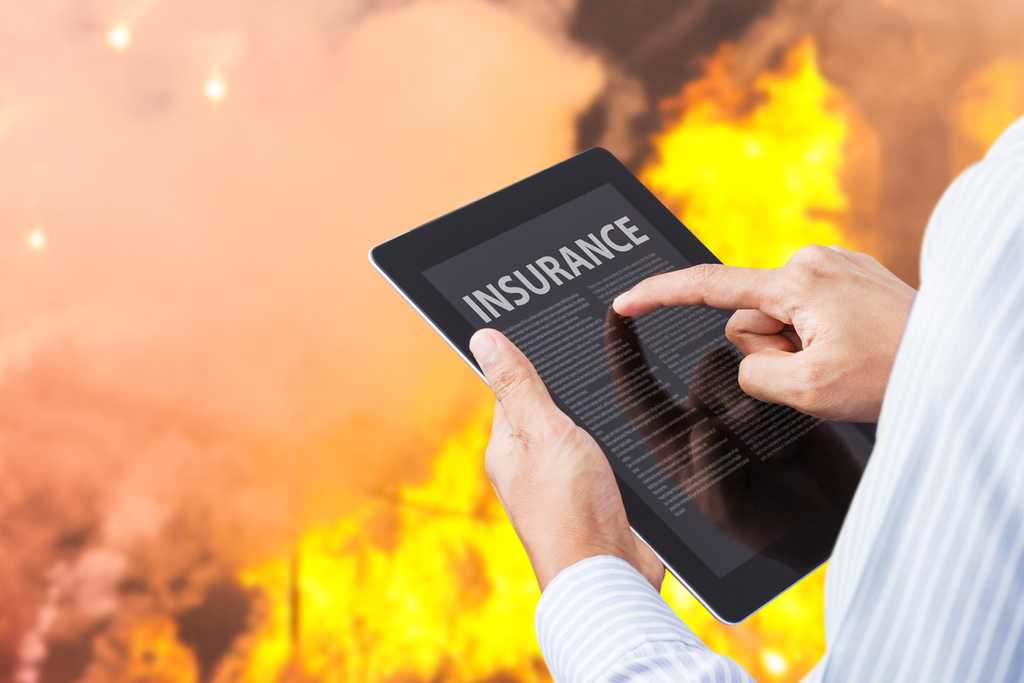Homeowners insurance is a requirement for most homeowners who take out a loan to finance their home purchase. Without homeowners insurance, it’s pretty impossible to find a financial institution willing to give you a mortgage.
Homeowners insurance is important for more than just securing a loan — it can also help pay to repair or replace your home and belongings in case of a disaster. Homeowners insurance policies typically include fire damage coverage. Fire is one of the named perils covered in HO-2, or "named perils" coverage, and is also included in HO-3, or "broad form" coverage.
Is fire insurance different from homeowners insurance?
No, there is no such thing as stand-alone fire insurance. Instead, your homeowners insurance includes coverage designed to protect you if your home catches on fire. Rather than having to pay for repairs out of pocket, your homeowners insurance fire coverage can take care of it for you so you can focus on getting back to normal post-fire.
What is fire insurance?
Fire coverage is part of a homeowners insurance policy. It is designed to help pay for repairs or replacements of your home or belongings when you’re the victim of a house fire. It can also help pay for damage to surrounding structures like detached garages or sheds, fences, or even neighboring houses that suffer damage from your house fire.
How fire insurance works
Like any type of insurance, you’ll need to file a claim with an insurance agent in order to get your home repairs covered.
After making sure your family and pets are okay, you’ll need to call your insurance agent to file a claim. They will ask for your personal and policy information, the details of the fire (such as the date and time it occurred), a description of the fire and the resulting damage, photos or videos of the damage, and the official report from the police or fire department. Once they have all that information, they can begin processing your claim.
After they have the claim started, your insurance company will send out an inspector to assess the damage and report back. The insurance provider will use that information to determine whether your home can be repaired or whether you’re looking at a rebuild or new purchase, and they’ll let you know how much they will cover. You can then get started with repairing the damage caused by the fire.
What does a fire insurance policy cover?
Your home insurance fire coverage covers accidental fires that damage your home, whether it’s a minor fire in the kitchen with a small amount of smoke damage or a whole home fire that destroys your house and makes it unlivable.
The following are typically covered by your fire coverage.
Grease fires
If you accidentally catch grease or cooking oil on fire while you’re making dinner, your homeowners insurance will probably cover the damage.
Candle fires
Candles smell great and can help add a touch of class to your home, but they can cause a lot of damage if they are accidentally knocked over while aflame. Whether you knock over a lit candle or a child or pet does, the damage from this type of fire will likely be covered by your homeowners insurance, provided it was an accident.
Electrical fires
A fault in your electrical system can sometimes cause a fire which can be very damaging. If your home and belongings are damaged by this type of fire, chances are high that their repair and replacement will be covered. (However, remember that it’s important to make sure your home’s electrical system is up to par, so consider getting it checked by a certified electrician, especially if it’s on the older side.)
Lightning or natural disasters
Fire caused by lightning or any type of natural disaster should be covered by your policy. The one exception is wildfire, which is covered in more detail in the next section.
Fire caused by vandalism
If your home is vandalized and a fire breaks out, that will likely be covered by your homeowners insurance as well.
What doesn’t a fire insurance policy cover?
While fire insurance policies cover many accidental fires in your home, there are also several types of fire they will not cover.
Intentional fire
If it’s proven that you set the fire in your home intentionally, your insurance policy will not cover it. Furthermore, you will likely face insurance fraud charges if you attempted to make a claim after purposefully setting a fire. And if anyone was injured or killed in the fire, you may be looking at much worse charges than just fraud.
Wildfire
If you live in a part of the country that’s prone to wildfires, your homeowners insurance probably won’t cover any damage caused by one. That’s similar to someone living in a flood-prone area having a hard time getting flood coverage. If you are able to find fire coverage in a wildfire-prone area, expect it to be extremely expensive.
War
Your homeowners insurance will not cover a fire that is the result of the break-out of war in your region. While this isn’t a likely scenario in the U.S., it’s worth keeping in mind.
What types of insurance cover fires?
If you make an insurance claim after a house fire, there are several types of coverage that will come into play. Here are the main ones to keep in mind, all of which are under the umbrella of homeowners insurance.
Dwelling coverage
This is the coverage that will take care of your home itself. If you have extensive smoke damage, your dwelling coverage will help pay to repair that damage and replace any elements of your home, such as drywall or bathroom cabinets, that have been affected. If your home has suffered extensive damage and is no longer livable, your dwelling coverage will help pay to rebuild your home — or, if your home is beyond repair, it’ll pay for you to buy or build a home of similar size and value.
Dwelling coverage limits are usually based on the value of your home, or the amount of money it would cost to build a home of similar size and style if your house is destroyed by a fire or other disaster.
Personal property coverage
This coverage will take care of any belongings that have been damaged or destroyed in the fire. You can choose the limits you want to set, either for the policy cap or for each individual item. You can also determine how much personal property coverage to take out based on your budget.
It’s important to take inventory of your personal property to get an estimate on how much it’d cost to replace them if destroyed, and then match your coverage limit to that amount. If your personal property coverage is too low, you’ll find that you’re paying out of pocket to replace some of the belongings you lost in the fire.
Loss of use coverage
If your home is no longer habitable, loss of use coverage can help pay for expenses incurred. That could include hotel or short-term rental fees, meals out, laundry fees, storage costs, parking fees, increased utility expenses, or relocation fees.
Loss of use coverage is automatically included in your homeowners insurance and the limits are typically based upon a percentage of your dwelling insurance. So if your home is valued at $300,000 and your loss of use coverage limit is 20%, your loss of use coverage limit will be $60,000.
Personal liability coverage
If the fire is extensive enough to cause damage to a neighboring property, your personal liability coverage will help pay to repair that property if your neighbor sues you for damages. Your personal liability coverage may not be enough to cover major damage to a neighbor’s house, so in that case you should consider taking out personal umbrella insurance.
Personal umbrella insurance
Personal umbrella insurance has nothing to do with actual umbrellas, but it can help pay for extras like legal fees and any additional repair costs beyond your personal liability coverage limit. It’s a good idea to have personal umbrella insurance if paying for such expenses out of pocket would be a huge burden for you (or even impossible).
How much fire insurance do I need?
The answer to that depends on the size and value of your home, and your budget. It’s important to work with your insurance agent when taking out your homeowners policy to determine the coverage limits that work for you.
Check what the standard fire coverage is in your homeowners policy. It’s a good idea to check your home’s value each year to make sure your insurance coverage is sufficient to replace your home if needed. You can always increase your coverage, but you cannot have coverage that exceeds the current market value of your home.
Hopefully, you’ll never experience a house fire and won’t need to use your homeowners insurance fire coverage. But if you do and you haven’t taken out enough coverage, you could find yourself having to settle for a smaller house, or paying for some of the repairs to your existing house using your own money.
Summary
Fire insurance coverage is part of your larger and more comprehensive homeowners insurance policy. It can help repair or rebuild your home after a fire, replace any belongings that were destroyed, and pay for expenses incurred if you have to find temporary housing while your home is being repaired. Homeowners insurance is a must for anyone who owns or wants to own a home. To find the best coverage, it’s a good idea to shop around to find a policy that fits your budget and needs.

